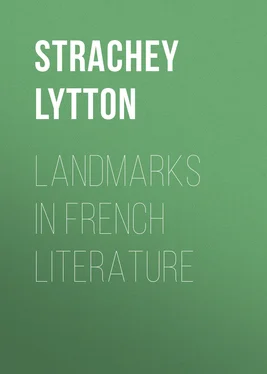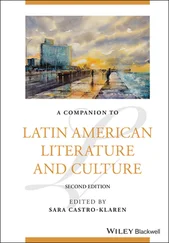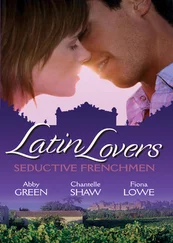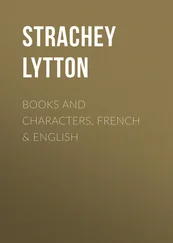Lytton Strachey - Landmarks in French Literature
Здесь есть возможность читать онлайн «Lytton Strachey - Landmarks in French Literature» — ознакомительный отрывок электронной книги совершенно бесплатно, а после прочтения отрывка купить полную версию. В некоторых случаях можно слушать аудио, скачать через торрент в формате fb2 и присутствует краткое содержание. Жанр: Языкознание, foreign_antique, foreign_prose, Зарубежные любовные романы, на английском языке. Описание произведения, (предисловие) а так же отзывы посетителей доступны на портале библиотеки ЛибКат.
- Название:Landmarks in French Literature
- Автор:
- Жанр:
- Год:неизвестен
- ISBN:нет данных
- Рейтинг книги:4 / 5. Голосов: 1
-
Избранное:Добавить в избранное
- Отзывы:
-
Ваша оценка:
- 80
- 1
- 2
- 3
- 4
- 5
Landmarks in French Literature: краткое содержание, описание и аннотация
Предлагаем к чтению аннотацию, описание, краткое содержание или предисловие (зависит от того, что написал сам автор книги «Landmarks in French Literature»). Если вы не нашли необходимую информацию о книге — напишите в комментариях, мы постараемся отыскать её.
Landmarks in French Literature — читать онлайн ознакомительный отрывок
Ниже представлен текст книги, разбитый по страницам. Система сохранения места последней прочитанной страницы, позволяет с удобством читать онлайн бесплатно книгу «Landmarks in French Literature», без необходимости каждый раз заново искать на чём Вы остановились. Поставьте закладку, и сможете в любой момент перейти на страницу, на которой закончили чтение.
Интервал:
Закладка:
The purpose of Rabelais' book cannot be summed up in a sentence. It may be described as the presentment of a point of view: but what point of view? There lies the crux of the question, and numberless critics have wrangled over the solution of it. The truth is, that the only complete description of the point of view is to be found—in the book itself; it is too wide and variegated for any other habitation. Yet, if it would be vain to attempt an accurate and exhaustive account of Rabelais' philosophy, the main outlines of that philosophy are nevertheless visible enough. Alike in the giant-hero, Pantagruel, in his father, Gargantua, and in his follower and boon-companion, Panurge, one can discern the spirit of the Renaissance—expansive, humorous, powerful, and, above all else, alive. Rabelais' book is the incarnation of the great reaction of his epoch against the superstitious gloom and the narrow asceticism of the Middle Ages. He proclaims, in his rich re-echoing voice, a new conception of the world; he denies that it is the vale of sorrows envisioned by the teachers of the past; he declares that it is abounding in glorious energy, abounding in splendid hope, and, by its very nature, good. With a generous hatred of stupidity, he flies full tilt at the pedantic education of the monasteries, and asserts the highest ideals of science and humanity. With an equal loathing of asceticism, he satirizes the monks themselves, and sketches out, in his description of the Abbey of Theleme, a glowing vision of the Utopian convent. His thought was bold; but he lived in a time when the mildest speculation was fraught with danger; and he says what he has to say in the shifting and ambiguous forms of jest and allegory. Yet it was by no means simply for the sake of concealment that he made his work into the singular mixture that it is, of rambling narrative, disconnected incident, capricious disquisition, and coarse humour. That, no doubt, was the very manner in which his mind worked; and the essential element of his spirit resides precisely in this haphazard and various looseness. His exceeding coarseness is itself an expression of one of the most fundamental qualities of his mind—its jovial acceptance of the physical facts of life. Another side of the same characteristic appears in his glorification of eating and drinking: such things were part of the natural constitution of man, therefore let man enjoy them to the full. Who knows? Perhaps the Riddle of the Universe would be solved by the oracle of la dive Bouteille .
Rabelais' book is a history of giants, and it is itself gigantic; it is as broad as Gargantua himself. It seems to belong to the morning of the world—a time of mirth, and a time of expectation; when the earth was teeming with a miraculous richness, and the gods walked among men.
In the Essays of MONTAIGNE, written about a generation later, the spirit of the Renaissance, which had filled the pages of Rabelais with such a superabundant energy, appears in a quieter and more cultivated form. The first fine rapture was over; and the impulsive ardours of creative thought were replaced by the calm serenity of criticism and reflection. Montaigne has none of the coarseness, none of the rollicking fun, none of the exuberant optimism, of Rabelais; he is a refined gentleman, who wishes to charm rather than to electrify, who writes in the quiet, easy tone of familiar conversation, who smiles, who broods, and who doubts. The form of the detached essay, which he was the first to use, precisely suited his habit of thought. In that loose shape—admitting of the most indefinite structure, and of any variety of length, from three pages to three hundred—he could say all that he wished to say, in his own desultory, inconsecutive, and unelaborate manner. His book flows on like a prattling brook, winding through pleasant meadows. Everywhere the fruits of wide reading are manifest, and numberless Latin quotations strew his pages. He touches on every side of life—from the slightest and most superficial topics of literature or manners to the profoundest questions that beset humanity; and always with the same tact and happiness, the same wealth of learned illustration, the same engaging grace.
The Essays are concerned fundamentally with two subjects only. First, they illustrate in every variety of way Montaigne's general philosophy of life. That philosophy was an absolutely sceptical one. Amid the mass of conflicting opinions, amid the furious oppositions of creeds, amid the flat contradictions of loudly-asseverated dogmas, Montaigne held a middle course of calm neutrality. Que Sçais-je? was his constant motto; and his Essays are a collection of numberless variations on this one dominating theme. The Apologie de Raimond Sebond , the largest and the most elaborate of them, contains an immense and searching review of the errors, the incoherences, and the ignorance of humanity, from which Montaigne draws his inevitable conclusion of universal doubt. Whatever the purely philosophical value of this doctrine may be, its importance as an influence in practical life was very great. If no opinion had any certainty whatever, then it followed that persecution for the sake of opinion was simply a wicked folly. Montaigne thus stands out as one of the earliest of the opponents of fanaticism and the apostles of toleration in the history of European thought.
The other subject treated of in the Essays, with an equal persistence and an equal wealth of illustration, is Montaigne himself. The least reticent of writers, he furnishes his readers with every conceivable piece of information concerning his history, his character, his appearance, his health, his habits and his tastes. Here lies the peculiar charm of his book—the endless garrulity of its confidences, which, with their combined humour, suavity, and irresponsibility, bring one right into the intimate presence of a fascinating man.
For this reason, doubtless, no writer has ever been so gushed over as Montaigne; and no writer, we may be sure, would be so horrified as he at such a treatment. Indeed, the adulation of his worshippers has perhaps somewhat obscured the real position that he fills in literature. It is impossible to deny that, both as a writer and as a thinker, he has faults—and grave ones. His style, with all its delightful abundance, its inimitable ease, and its pleasant flavour of antiquity, yet lacks form; he did not possess the supreme mastery of language which alone can lead to the creation of great works of literary art. His scepticism is not important as a contribution to philosophical thought, for his mind was devoid both of the method and of the force necessary for the pursuit and discovery of really significant intellectual truths. To claim for him such titles of distinction is to overshoot the mark, and to distract attention from his true eminence. Montaigne was neither a great artist nor a great philosopher; he was not great at all. He was a charming, admirable human being, with the most engaging gift for conversing endlessly and confidentially through the medium of the printed page ever possessed by any man before or after him. Even in his self-revelations he is not profound. How superficial, how insignificant his rambling ingenuous outspokenness appears beside the tremendous introspections of Rousseau! He was probably a better man than Rousseau; he was certainly a more delightful one; but he was far less interesting. It was in the gentle, personal, everyday things of life that his nature triumphed. Here and there in his Essays, this simple goodness wells up clear and pure; and in the wonderful pages on Friendship, one sees, in all its charm and all its sweetness, that beautiful humanity which is the inward essence of Montaigne.
CHAPTER III
THE AGE OF TRANSITION
In the seventy years that elapsed between the death of Montaigne (1592) and the accession to power of Louis XIV the tendencies in French literature were fluctuating and uncertain. It was a period of change, of hesitation, of retrogression even; and yet, below these doubtful, conflicting movements, a great new development was germinating, slowly, surely, and almost unobserved. From one point of view, indeed, this age may be considered the most important in the whole history of the literature, since it prepared the way for the most splendid and characteristic efflorescence in prose and poetry that France has ever known; without it, there would have been no Grand Siècle. In fact, it was during this age that the conception was gradually evolved which determined the lines upon which all French literature in the future was to advance. It can hardly be doubted that if the fertile and varied Renaissance movement, which had given birth to the Pléiade , to Rabelais, and to Montaigne, had continued to progress unbroken and unchecked, the future literature of France would have closely resembled the contemporary literatures of Spain and England—that it would have continued to be characterized by the experimental boldness and the loose exuberance of the masters of the sixteenth century. But in France the movement was checked: and the result was a body of literature, not only of the highest value, but also of a unique significance in European letters.
Читать дальшеИнтервал:
Закладка:
Похожие книги на «Landmarks in French Literature»
Представляем Вашему вниманию похожие книги на «Landmarks in French Literature» списком для выбора. Мы отобрали схожую по названию и смыслу литературу в надежде предоставить читателям больше вариантов отыскать новые, интересные, ещё непрочитанные произведения.
Обсуждение, отзывы о книге «Landmarks in French Literature» и просто собственные мнения читателей. Оставьте ваши комментарии, напишите, что Вы думаете о произведении, его смысле или главных героях. Укажите что конкретно понравилось, а что нет, и почему Вы так считаете.












